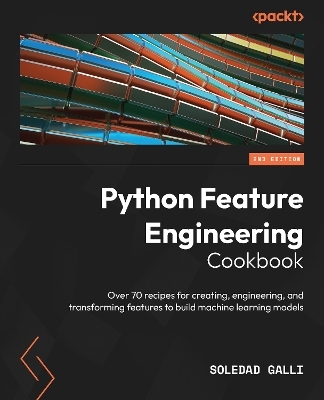
Python Feature Engineering Cookbook
Packt Publishing Limited (Verlag)
978-1-80461-130-2 (ISBN)
Create end-to-end, reproducible feature engineering pipelines that can be deployed into production using open-source Python libraries
Key Features
Learn and implement feature engineering best practices
Reinforce your learning with the help of multiple hands-on recipes
Build end-to-end feature engineering pipelines that are performant and reproducible
Book DescriptionFeature engineering, the process of transforming variables and creating features, albeit time-consuming, ensures that your machine learning models perform seamlessly. This second edition of Python Feature Engineering Cookbook will take the struggle out of feature engineering by showing you how to use open source Python libraries to accelerate the process via a plethora of practical, hands-on recipes.
This updated edition begins by addressing fundamental data challenges such as missing data and categorical values, before moving on to strategies for dealing with skewed distributions and outliers. The concluding chapters show you how to develop new features from various types of data, including text, time series, and relational databases. With the help of numerous open source Python libraries, you'll learn how to implement each feature engineering method in a performant, reproducible, and elegant manner.
By the end of this Python book, you will have the tools and expertise needed to confidently build end-to-end and reproducible feature engineering pipelines that can be deployed into production.
What you will learn
Impute missing data using various univariate and multivariate methods
Encode categorical variables with one-hot, ordinal, and count encoding
Handle highly cardinal categorical variables
Transform, discretize, and scale your variables
Create variables from date and time with pandas and Feature-engine
Combine variables into new features
Extract features from text as well as from transactional data with Featuretools
Create features from time series data with tsfresh
Who this book is forThis book is for machine learning and data science students and professionals, as well as software engineers working on machine learning model deployment, who want to learn more about how to transform their data and create new features to train machine learning models in a better way.
Soledad Galli is a data scientist, instructor, and software developer with more than 10 years of experience in world-class academic institutions and renowned businesses. She has developed and put into production machine learning models to assess insurance claims and credit risk and prevent fraud. She teaches multiple online courses on machine learning, which have enrolled 44,000+ students worldwide and consistently receive good student reviews. She is also the developer and maintainer of the open source Python library Feature-engine, which is currently downloaded 100,000+ times per month. Soledad received a Data Science Leaders Award in 2018 and was recognized as one of LinkedIn's voices in data science and analytics in 2019.
Table of Contents
Imputing Missing Data
Encoding Categorical Variables
Transforming Numerical Variables
Performing Variable Discretization
Working with Outliers
Extracting Features from Date and Time
Performing Feature Scaling
Creating New Features
Extracting Features from Relational Data with Featuretools
Creating Features from Time Series with tsfresh
Extracting Features from Text Variables
| Erscheinungsdatum | 03.11.2022 |
|---|---|
| Verlagsort | Birmingham |
| Sprache | englisch |
| Maße | 75 x 93 mm |
| Themenwelt | Mathematik / Informatik ► Informatik ► Software Entwicklung |
| Informatik ► Theorie / Studium ► Künstliche Intelligenz / Robotik | |
| ISBN-10 | 1-80461-130-1 / 1804611301 |
| ISBN-13 | 978-1-80461-130-2 / 9781804611302 |
| Zustand | Neuware |
| Haben Sie eine Frage zum Produkt? |
aus dem Bereich


